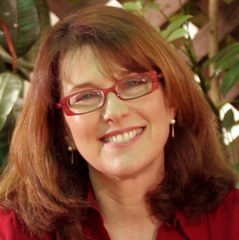 Mike Stevens is one of the funniest guys I know. In spite of getting wrung through the soul-flattenin’, hand-crankin’ washing machine of cancer treatment — a dozen rounds of chemo, a lobectomy, gamma knife surgery, and two clinical trials — he’s always quick to laugh, crack a joke, or break into an enormous smile.
Mike Stevens is one of the funniest guys I know. In spite of getting wrung through the soul-flattenin’, hand-crankin’ washing machine of cancer treatment — a dozen rounds of chemo, a lobectomy, gamma knife surgery, and two clinical trials — he’s always quick to laugh, crack a joke, or break into an enormous smile.
He regularly speaks, live, before large groups of people. As a cancer superstar, a stage-4 lung cancer patient who’s outlived his prognosis by five years or so, he makes himself available to news media and at fundraisers, most recently the San Diego Breath of Hope, where he raised more money for the Lung Cancer Alliance than anyone else.
“Who thinks that cancer is the best thing that ever happened to you?” Mike often begins his speeches.
The crowds go limp like tired old celery.
“Think about it. A lot of you don’t have to work anymore. You get handicapped parking places. Before I was diagnosed I hadn’t talked to my dad in ten years. I called him up and now we talk all the time.
“I climbed the tallest mountain in the world. I entered a photo contest and won a 1-week trip to a photo safari in Africa, which I turned into a 3-week trip with my wife and kids.
“I woulda jumped out of an airplane without a parachute but my family wouldn’t let me.
“These are all things I never would have done had I not had cancer.”
I’m 100% with Mike on this. When I called him this morning to make sure I wasn’t misquoting him, he said, “You and I, we belong to an elite group. Most people with lung cancer die in the first year. We’re so lucky.”
Now that I’ve been diagnosed with lung cancer again (a test this week showed adenocarcinoma, a faster growing form of lung cancer) I am reflecting more on my good fortune. And I’m more committed than ever to keep doing wild and crazy things like flying to Chicago to surprise our son Brett for his birthday, which we did last week.
But the thing is, although cancer may be one of the best things that’s ever happened to ME, it’s probably not the best thing that’s happened to people who care about me. And that’s the rub. Here’s how my friends and loved ones may be impacted:
• They may be scared of losing me, literally and figuratively. Not only is there a possibility that I may die, but the old me, flawed as I was, may be gone for a while or forever.
• They may fear not being able to be there for me in the way I need them to be; they may fear saying or doing the “wrong thing”, especially when that’s my area of expertise.
• They may fear losing their freedom. Caregiving sucks resources – time, energy, emotions, and of course money. Resources spent on an ill loved one are resources no longer left for onesself.
What else might they fear?
I’m feeling sad for my loved ones. I’m trying to practice self-compassion rather than self-flagellation, and am holding onto the hope that I’ll find my way through these sticky thickets.
So where does all this meandering leave us? Right where we began. Just about the only thing that gets me through the night and out of myself – out of my own pain, fear, and loneliness – is humor. Linda Creed lyricized in “The Greatest Love of All,” which she wrote in the midst of her battle with breast cancer in 1977, “No matter what they take from me, they can’t take away my dignity.” Or my sense of humor!
Mike Stevens, keep those laughs coming. Keep ‘em coming for all of us punched-by-cancer – patients, friends, loved ones, caregivers, even healthcare providers. Studies show that humor build hope and that hope heals.
 And keep on counting those blessings, because gratitude heals, as well. The last and perhaps most important statement in my revised book, 20 things people with cancer want others to know
And keep on counting those blessings, because gratitude heals, as well. The last and perhaps most important statement in my revised book, 20 things people with cancer want others to know, is, “I am more grateful than I can say for your care, compassion, and support.”
Lori Hope is the author of the revised and updated Help Me Live: 20 things people with cancer want you to know. Her website, LoriHope.com features a humor resource page. You can leave your favorite comedy ideas and jokes at the bottom of the page:
Edited from the original article published on CarePages.com
RELATED (Good News Network): What Cancer Patients Want Most – To Laugh



















